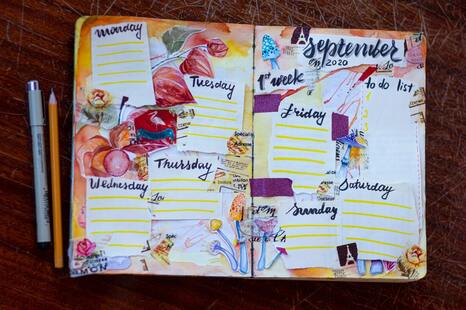Words, Ideas, StuffSome ideas and thoughts, captured with the view to help you.
|
|
Decided to do a throwback to the days of Uni assignments and compare and contrast some schools of thought on procrastination. Here we delve into the science of procrastination and the positive view of it. Weirdly landed in a pretty similar place when all is said and done, so here's a short overview of each, and a wrap up at the end. Enjoy! Our Brains on Procrastination Heading into the deep, dark world of scientific research on procrastination, there were some gems to be found. Eric Jaffe “experts define it as the voluntary delay of some important task that we intend to do, despite knowing that we’ll suffer as a result” Professor Tim Pychyl, from Carleton University, Ottawa, who has been studying procrastination for the past few decades, believes it is a problem with managing emotions rather than time. "This study provides physiological evidence of the problem procrastinators have with emotional control," he says. “In research settings, people who procrastinate have higher levels of stress and lower well-being.” Joseph Ferrari, a professor of psychology at DePaul University says that while we almost all procrastinate, only about 20% of us are chronic procrastinators, and for those people it’s not about time-management. He says. “As I tell people, to tell the chronic procrastinator to just do it would be like saying to a clinically depressed person, cheer up.” His work and much of the deep science crew, negate the views of the positive procrastination team below. In 1997 Dianne Tice and her colleagues developed a scale, model and researched the habits of tertiary students and concluded: “Procrastinators earned lower grades than other students and reported higher cumulative amounts of stress and illness. True procrastinators didn’t just finish their work later — the quality of it suffered, as did their own well-being.” There does seem to be a common thread in the science world on this, summed up by psychologist Timothy Pychyl “Emotional regulation, to me, is the real story around procrastination, because to the extent that I can deal with my emotions, I can stay on task” His work with Sirois blends the short term mood boost from procrastinating with the longer term damage it creates. They say that “procrastinators comfort themselves in the present with the false belief that they’ll be more emotionally equipped to handle a task in the future”. “The future self becomes the beast of burden for procrastination,” says Sirois. “We’re trying to regulate our current mood and thinking our future self will be in a better state. They’ll be better able to handle feelings of insecurity or frustration with the task. That somehow we’ll develop these miraculous coping skills to deal with these emotions that we just can’t deal with right now.” Laura Rabin is leading work on connecting our brain’s executive functioning with the emotional work done to date, and while some themes are appearing, there’s more to do. It seems the summary of this type of research is that there are few new areas of focus, which are less about grunt work, less focused on task design, and more about the mental and emotional states we’re in to help us get where we want to be. It does remind me of the marshmallow experiment where delayed gratification (the ability to wait to obtain something that one wants), was tested. So how do we get ourselves primed for the work, get the work done, get some feel good vibes AND achieve things? Million dollar question here with no clear answer. What we can do is firstly take responsibility for setting ourselves up for success and for owning our choices. Ultimately delaying is a choice, Starting is a choice. Choose what you want to do! 
Positive ProcrastinationPiers Steel, a psychologist at the University of Calgary says that we will use a bad task to avoid a really bad task so we can play them off against each other to get through them, although we still need some grunt to do the one we really don’t want to do. Makes sense right – take on the lesser of the two evils? John Perry calls this “Structured procrastination” and he says: “At the top of your to-do list, put a couple of daunting, if not impossible, tasks that are vaguely important-sounding (but really aren’t) and seem to have deadlines (but really don’t). Then, farther down the list, include some doable tasks that really matter.” Which sounds a lot like gaming yourself, or the equivalent of eat your vegetables so you can get dessert?  What if you’re not a ‘to do’ list kind of person? There’s some work from the Procrastination Research Group at Carleton University which is spearheaded by Timothy Pychyl. He writes on Psychology Today’s site about findings from his colleague, Shamarukh Chowdhury’s research on a small sample of a few hundred students. The data showed that people who are naturally conscientious (one of the big five personality traits, worth a Google to learn more on this too btw), and who normally use to do lists, they’re an effective tool for you. For those that lie more on the side of procrastinate than #GSD, it’s possible conscientiousness is also a little lower and you likely aren’t native list makers, so to get the gears moving, creating the list as the first new habit can be helpful in getting through the things you’re putting off. Interestingly too there is a gender difference in her research, with females creating to-do list more so than males, but Pychyl reminds us that “there is no gender difference in conscientiousness” so all of us can learn to game our day and get writing those lists if we want to try some tactics to beat down procrastination. Back to Perry though, and important in 2021 as we work during mixed mode times - his research suggest that through more flexible work we’re now procrastinating a lot – 25% of work time, and for students, 1/3 of the time. And apparently men are more likely to procrastinate than women, especially young men. So is this the case where the ‘good girl’ messaging is helping us gain an edge? If all things were equal, then maybe. Their data also shows that 95% of us do procrastinate. Makes me wonder that instead of structuring our tasks to game ourselves into doing the work, are we really giving ourselves enough creative or down time? I don’t know about you but the great ideas, the solutions I’ve been seeking, or the energy lift I need often come when I am baking lemon slice instead of financial modelling, or when I’m doing a 20 min Zumba class on Youtube. Those a-ha moments or flashes of brilliance rarely come when I force myself to be desk bound or belligerently pushing on and on and on. They come when I’m in flow, or when I’m allowing my brain to do it’s background computational stuff and finding solutions. So there’s an argument for downtime. There’s also a massive argument for why the traditional industrial era eight hour work day is crap, but that’s not the soapbox I’m climbing on right now. The takeaway here is that perhaps ensuring enough ‘play’ time each day, is actually helpful, knowing when to take a break and putting a time on it might be good, and switch to a low energy task or a creative task can help. It’s also about locking in the good stuff and doing the things that shift the dial for you, the urgent and important things. If that means creating tricky to do lists, giving yourself a weekly reward for ‘eating the frog first’ each day, or doing only five minute mind breaks every hour (code for social scrolling) helps you create a way to complete what’s needed in a way that doesn’t suck the life outta you, then let’s go! There’s a tonne of insight from the CA team that argue that procrastination isn’t about time management (although list making etc can help) but it’s more about emotional regulation which is detailed above. Basically, the formula is manage yourself to feel good and get cracking, as when you feel bad, you’re more likely to avoid the stuff that needs to be done and instead find ways to feel good. Right so that’s the over simplified version of it as I want to wrap this up in case you’re using reading this as a procrastination tactic! Summation of it is that when we feel good, we’re connected to our goals and future, we feel we know the next step or two and we get cracking, we’re onto a winner. If you’re interested in learning more about this, head into the web vortex and search for emotion-regulation strategies, it’s fun! One final point on procrastinating is that all these experts with the data, the tools, the tricks and the labels, still say the same basic thing for when you’re stuck in the loop …. “just get started”. Take the first step. To quote the great Chinese Philosopher, Lao Tzu “A journey of a thousand miles must begin with a single step”. This is the most well known part of his quote, but the whole paragraph is really good, and relevant for this topic: Do the difficult things while they are easy and do the great things while they are small. A journey of a thousand miles must begin with a single step. Top up the good vibes and then get steppin’! References:
https://www.psychologytoday.com/ca/blog/dont-delay/202002/do-do-lists-work https://www.nytimes.com/2013/01/15/science/positive-procrastination-not-an-oxymoron.html https://www.psychologytoday.com/ca/blog/dont-delay/202003/negative-emotions-today-predict-procrastination-tomorrow https://www.bbc.com/news/health-45295392 https://www.procrastination.ca/ https://www.sciencedaily.com/releases/2018/08/180822090455.htm https://www.psychologicalscience.org/observer/why-wait-the-science-behind-procrastination
0 Comments
Your comment will be posted after it is approved.
Leave a Reply. |
Categories
All
AuthorMelissa Davies Archives
January 2024
|



 RSS Feed
RSS Feed